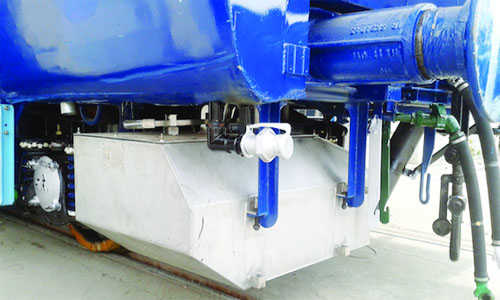
Study: Bio-toilets ineffective or ill-maintained; water discharged no better than raw sewage
Srinand Jha
A new kind of toilet using bacteria to break down human excreta has been deployed in Indian trains over four years to 2017, at a cost of Rs 1,305 crore, but this toilet is no better than a septic tank, the Indian Institute of Technology-Madras (IIT-M) has concluded after a two-year study.
As many as 93,537 “bio-digesters”, as the toilets are called, have been installed in mainline express and mail trains. These are small-scale sewage-treatment systems beneath the toilet seat: Bacteria in a compost chamber digests human excreta, leaving behind water and methane. Only the water, disinfected later, is let out on the tracks.
However, sanitation experts and various studies, including those commissioned by the railways, have pointed out that most of the new “bio-toilets” are ineffective or ill maintained and the water discharged is no better than raw sewage.
“Our tests have found that the organic matter (human waste) collecting in the bio-digesters does not undergo any kind of treatment,” IIT professor Ligy Philip, who headed the latest study, said. “Like in the septic tanks, these bio-digesters accumulate slush (human excreta mixed with water).”
The IIT-M study was sponsored by the Bill and Melinda Gates Foundation and submitted last week to the Union Ministry of Urban Affairs.
Despite the criticism, an additional 120,000 coaches are to be fitted with these bio-toilets, jointly developed by the Defence Research and Development Organisation (DRDO) and the Indian Railways, by December 2018. This is likely to cost Rs 1,200 crore, the railways revealed on November 2, in response to a RTI request.
The bio-digester project began during the previous UPA regime, but has been speeded up under Prime Minister Narendra Modi’s Swachh Bharat campaign. The idea is to meet this target in time for the celebration of Mahatma Gandhi’s 150th birth anniversary in 2019, said Railway Ministry spokesperson Anil Kumar Saxena.
Indian Railways are often described as the world’s biggest toilet: It ejects around 3,980 tonnes of faecal matter — the equivalent of 497 truckloads — onto rail tracks every day, according to a report released by the Comptroller and Auditor General (CAG) in 2013.
Since 1993, the Indian Railways have been experimenting with a host of technologies to replace the open discharge system. This included vacuum toilets based on suction, commonly seen in aircraft; “controlled-discharge” toilet systems (CDTS) which allow waste to be dropped only after a train acquires a speed of 30 kmph, thus keeping stations clean; and “zero-discharge” toilets, in which solid waste is stored, evacuated and then dumped in pits for composting and the liquid filtered for recycling.
In 2008, the railways decided to install the bio-digester model developed by the Gwalior-based Defence Research and Development Establishment (DRDE).
Responding to the criticism, government officials said the flaws are being fixed. “The issues regarding the bio-digesters are of a minor nature and are being effectively addressed. Some changes (in design or execution strategies) are inevitable, as this is a continuous process,” said Saxena.
Lokendra Singh, former director of the DRDE, had, after an expedition to Antarctica, brought home psychrophilic bacteria that can survive in extremely low temperatures. The bacteria were mixed with cowdung and normal soil, which have methogens (micro-organisms that produce methane) capable of breaking down human excreta. This was then supplied to the manufacturers of rail bio-digesters.
IANS, in arrangement with IndiaSpend.org



























